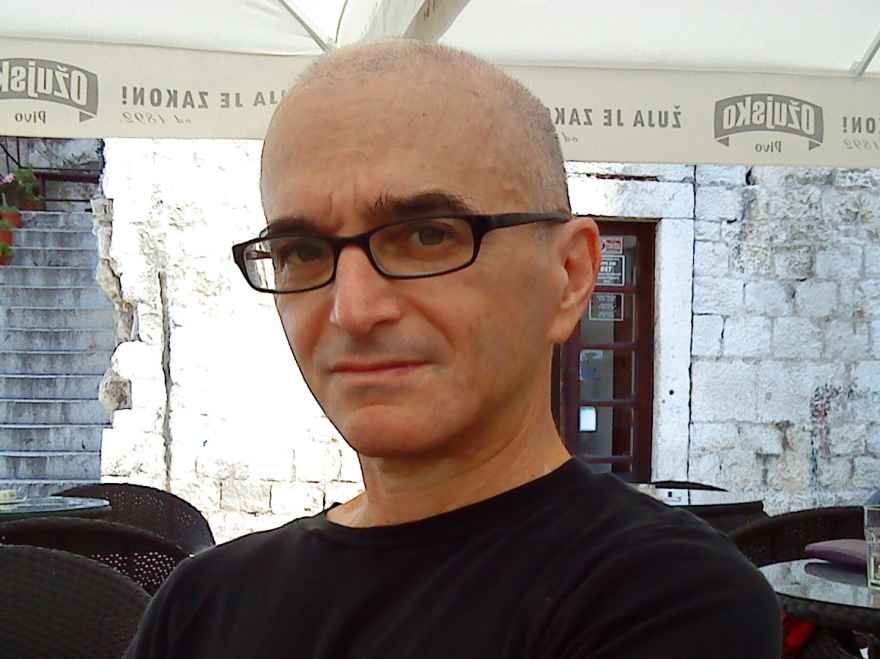International scholars recognize UChicago professor's original thinking

By Sara Patterson
UChicago Prof. Eric Santner does not belong to one discipline. Instead, he has explored different fields, which has led him to develop diverse concepts that combine literature, philosophy, psychoanalysis, and religious thought.
In tribute to his intellectual contributions, the Angelaki, Journal of the Theoretical Humanities, recently devoted an entire special issue to him called “Politics of the Flesh.” The issue contains articles written by an international group of philosophers, theologians, legal scholars, political theorists, and literary scholars who have found in Santner’s work resources for rethinking problems in their own areas of research. The authors presented many of these papers at an international conference called “The Weight of All Flesh” held in Munich in June 2023 at the Hochschule für Philosophie.
“Flesh is an extremely resonant word, embracing the carnal and spiritual,” said Santner, the Philip and Ida Romberg Distinguished Service Professor in the Departments of Germanic Study and Philosophy and the Divinity School at UChicago. “The concept helps us to think about the ways in which both the psychic and the somatic are intensified—inflamed—by their jointure. Every human society must cope with such inflammation. I take this to be Freud’s fundamental insight. The ‘Freudian body’ is a body inflamed by its socialization and its inscription into normative orders that lack firm foundations. That lack is what ultimately ‘excites’ the flesh into being.”
In the “Politics of the Flesh,” a roster of intellectual luminaries wrote about how Santner’s scholarship has influenced them. The authors include Dominik Finkelde, a German Jesuit priest, philosopher, and playwright; Rebekka A. Klein, professor of Theology at the Goethe University; the Slovenian philosopher Mladen Dolar; Agata Bielik-Robson, professor of Jewish Studies at the University of Nottingham; Robert Buch, professor of Comparative Literature at the University of Halle; and Luca di Blasi, professor of Philosophy at the University of Bern.
“Eric Santner is one of the most original philosopher-critics writing in English today,” said Julia Reinhard Lupton, Distinguished Professor of English and Interim Director of the University of California Humanities Research Institute at University of California, Irvine. “He understands our creaturely condition not as sheer embodiment but as our inherent incompleteness as persons.
“Our deepest vulnerability stems not from the needs of life per se but from the terrifying groundlessness of the civilizing processes into which we are so cruelly thrust. All of that dependence forms the scene in which we metamorphose from some body to Somebody, whether we want to or not.”
Critical influence
Santner’s most recent book, Untying Things Together: Philosophy, Literature, and a Life in Theory (2022), offers an intellectual history of “high theory” from poststructuralism to the present. Santner reads this history—one he tries to integrate with his own intellectual formation—against the backdrop not of a theory of sexuality but rather of the sexuality of theory.
In the book, Santner continues to rethink the points of overlap of political economy and libidinal economy addressed in his Tanner Lectures volume, The Weight of All Flesh: On the Subject-Matter of Political Economy (2016). He also revisits and further elaborates the notion of the “psychotheology of everyday life” first introduced in a study of Freud and Rosensweig.
“Although Eric and I work in very different fields, his work has been a constant influence on my own, said Justin Steinberg, professor and director of undergraduate studies in the Department of Romance Languages and Literatures at UChicago. “For example, I now find it impossible to consider the bodies of the souls in Dante’s afterlife or the plague bodies in Giovanni Boccaccio’s The Decameron without employing his conception of the remainder of the flesh.”
Santner “unties together” political economy, libidinal economy, and political theology in his efforts to take Ernst Kantorowicz’s understanding of the king’s two bodies into the era of popular sovereignty and market capitalism. In Sovereignty, Inc.: Three Inquiries in Politics, Literature, and a Life in Theory (2020), Santner, along with UChicago colleague William T. S. Mazzarella and philosopher Aaron Schuster, revisit the flesh of the sovereign’s carnal being as key to understanding politics in the age of Trump. Taking up the notion of mana familiar from older anthropological discussions of objects and persons endowed with special powers and linking it to Marx’s understanding of the metaphysical and theological aspects of the commodity form, Santner identifies Trump as the ultimate “brand name” at the center of a new “manatheistic” cult in which mana-facturing has displaced manufacturing.
“Eric Santner’s work retrieves the problem of ‘incarnation’ from the reactionaries and makes it available—vitally and urgently—for critical social theory,” said Mazzarella, the Neukam Family Professor in the Departments of Anthropology and of Social Sciences and the College. “He helps us understand how to go beyond the sort of ideology critique that remains stuck at the level of meaning and opinion, and that has no traction at all against the forces of darkness in our time.”
As an influential literary scholar, Santner succeeds in connecting the worldwide economic conditions of existence with questions about religion, philosophy, literature, politics, and psychoanalysis. His multidisciplinary approach resonates with scholars worldwide.